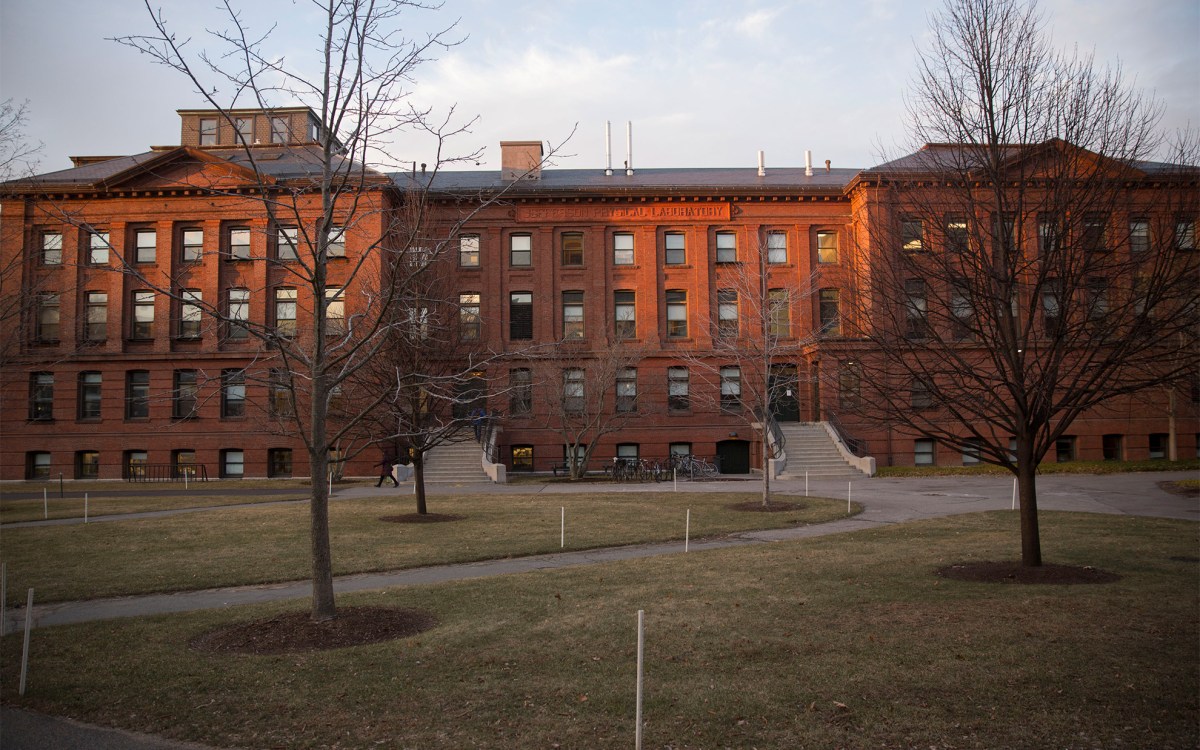Tag: Genomics
-
Campus & Community
Eli and Edythe Broad make unprecedented gift
Los Angeles-based philanthropists Eli and Edythe Broad on Sept. 4 declared the Broad Institute of Harvard and MIT an unprecedented success as an experiment in science and philanthropy and announced that they have increased their total gift to the Broad by $400 million to $600 million. The $400 million will be an endowment to convert…
-
Health
When genetics gets personal
Just five years after the Human Genome Project announced it had decoded the first human DNA, the era of personal genetics is dawning, bringing with it not just the promise of targeted, personalized medicine and a new level of self-knowledge, but also a host of ethical, legal, and practical issues. A new project out of…
-
Health
Eli and Edythe L. Broad endow the Broad Institute of Harvard and MIT with additional $400 million
Los Angeles-based philanthropists Eli and Edythe Broad today declared the Broad Institute of Harvard and MIT an unprecedented success as an experiment in science and philanthropy, and announced that they…
-
Campus & Community
In brief
Harvard-affiliated study runs in Journal of Community Psychology; Docents sought for Semitic Museum; Habitat for Humanity sale begins Aug. 23; HMS to host second ‘Freecycle’ event, donations sought; HMS to host quantitative genomics conference, poster component; Deadline for first print issue
-
Health
Next-generation tool for visualizing genomic data introduced
Researchers are collecting vast amounts of diverse genomic data with ever-increasing speed, but effective ways to visualize these data in an integrated manner have lagged behind the ability to generate them. To address this growing need, researchers at the Broad Institute of MIT and Harvard have developed the Integrative Genomics Viewer (IGV), a novel and…
-
Health
Biologist Venter will be visiting scholar at Origins of Life Initiative
J. Craig Venter, the visionary biologist and intellectual entrepreneur who was a leading figure in the decoding of the human genome, will join Harvard University as a visiting scholar at the University’s Origins of Life Initiative.
-
Health
‘Speed limit’ found on rate of evolution
Harvard University scientists have identified a virtual “speed limit” on the rate of molecular evolution in organisms, and the magic number appears to be six mutations per genome per generation — a rate of change beyond which species run the strong risk of extinction as their genomes lose stability.
-
Health
First robust genetic link to height in humans identified
Over a century ago, scientists first proposed that height is a complex trait — one influenced by environmental factors and multiple genes. While subsequent studies revealed that most of the…
-
Health
Opossum genome shows ‘junk’ DNA source of genetic innovation
A tiny opossum’s genome has shed light on how evolution creates new creatures from old, showing that change primarily comes by finding new ways of turning existing genes on and…
-
Campus & Community
Broad receives $100M gift to launch research center
The Stanley Medical Research Institute today announced a $100 million gift to the Broad Institute of MIT and Harvard to launch a new research center that will combine the strengths of genomics and chemical biology to advance the understanding and treatment of severe mental illnesses.
-
Health
Despite their heft, many dinosaurs had surprisingly tiny genomes
They might be giants, but many dinosaurs apparently had genomes no larger than those of a modern hummingbird. So say scientists who’ve linked bone cell and genome size among living species and then used that new understanding to gauge the genome sizes of 31 species of extinct dinosaurs and birds, whose bone cells can be…
-
Health
Practical way to target cancer cell mutations demonstrated
A study led by researchers at Dana-Farber Cancer Institute and Broad Institute of the Massachusetts Institute of Technology and Harvard University provides the first demonstration of a practical method of screening tumors for cancer-related gene abnormalities that might be treated with “targeted” drugs.
-
Health
Genome-wide map will help fight diabetes
The Broad Institute of MIT and Harvard, Lund University, and Novartis have announced the completion of a genome-wide map of genetic differences in humans and their relationship to type 2 diabetes and other metabolic disorders. The announcement was made Monday (Feb. 12). All results of the analysis are being made accessible, free of charge, on…
-
Health
Proteasome recognized as nuclear player on gene-transcription team
One of the most common agents in the cytoplasm of the cell, the proteasome, also plays a widespread and critical role in transcription from inside the cell nucleus. Pam Silver,…
-
Health
Lab moves genomic testing into the clinic
The earliest symptom of the inherited heart condition hypertrophic cardiomyopathy can be sudden death at a tragically young age. Harvard Medical School researchers discovered the first human gene underlying the…
-
Campus & Community
Cancer link to ‘protein promiscuity’ being studied
When found at abnormally high concentrations, two proteins implicated in many human cancers have the potential to spur indiscriminate biochemical signaling inside cells, chemists at Harvard University have found. Their…
-
Health
Double trouble: Cells with duplicate genomes can trigger tumors
So-called “double-value” cells are produced by random errors in cell division that occur with unknown frequency. The generation of these genetically unstable cells appears to be a “pathway for generating…
-
Health
Surprising variations discovered in human genomes
Researchers from Harvard Medical School and the University of Toronto in Canada looked at 55 healthy, unrelated men and women, and they discovered 255 regions with relatively large gains or…
-
Health
Scientists identify hundreds of worm genes that regulate fat storage
Findings by Harvard researchers, published in the Jan. 16, 2003 issue of Nature, represent the first survey of an entire genome for all genes that regulate fat storage. The research…
-
Health
Formin gene may explain a common cause of female infertility
Harvard Medical School researchers Philip Leder and Benjamin Leader have discovered that oocytes from female mice without the formin gene Fmn2 cannot correctly position the metaphase I DNA-spindle. This produces…
-
Health
Harvard researchers complete genomic sequence of deadly malaria parasite
Malaria is the world’s most serious parasitic tropical disease and kills more people than any communicable disease except for tuberculosis. There is more human malaria in Africa today than at…
-
Science & Tech
The next big thing in mining the genome
About 99.9 percent of the 3.1 billion base pairs in the human genome are the same from person to person. The remaining 0.1 percent of differences comprises more than 10…
-
Science & Tech
Mustard shows backbone in its own defense
Over the past few years, accumulated evidence from many scientists suggests that plants, animals, and insects share common elements in their innate skirmishes with potential pathogens. In the Feb. 28,…
-
Science & Tech
Human genome sequence yields new tool for microbe-hunting
Microbiologists have traditionally identified pathogens (disease-causing organisms) by growing them in a laboratory dish from a sample of infected tissue. But not all pathogens can be cultured this way. Molecular…
-
Health
Technique enables quick accounting of gene function
Now that whole genomes have been sequenced, a group of scientists has geared up for the next phase: identification and classification of newly discovered coding regions. The DNA microchip, developed…
-
Science & Tech
Scientists using gene chips identify unique form of leukemia
Currently, physicians diagnose and treat a rare form of cancer that strikes infants as a particularly aggressive form of the more common acute lymphoblastic leukemia. The cancer may respond to…
-
Health
Harvard scientists identify chromosome location of genes associated with long life
Scientists have long thought of aging as a complex process affected by perhaps a thousand genes. So a recent discovery by Harvard scientists that a gene or genes located on…
-
Health
Human genome tally: Is recount in order?
The surprising finding that humans have fewer genes than expected led to endless speculations and editorial comments. Would biotech stocks be threatened? Should humans be more humble? Were entirely new…
-
Health
In human genome race, competition spurred better science
The conflicts between the two teams — one publicly funded, one private — that raced to sequence the human genome often drew more attention than the actual completion of the…
-
Health
Specific gene provides health benefits for moderate drinkers
Moderate alcohol consumption among people who have a specific version of a gene that metabolizes alcohol yields health benefits — less risk of heart disease and higher good cholesterol levels.…


